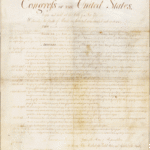In a partnership with the National Constitution Center, Khan Academy talked to constitutional scholars about ten of the most significant Supreme Court cases in history. Teachers can use this lesson as a supplemental resource during their Supreme Court unit to show how constitutional scholars can debate the outcomes of Supreme Court cases, as well as the impact these cases have had on the United States.
Arizona v. U.S. (2012)
Does federal law preempt Arizona’s immigration law? This case summary shows how the Supreme Court dealt with that question in 2012, concerning Arizona’s criminalization of undocumented immigration.
The U.S. Constitution: Continuity and Change in the Governing of the United States

This unit examines continuity and change in the governing of the United States. Lessons one and two are focused on a study of the Constitution and Bill of Rights and provide access to primary source documents from the Library of Congress. Lesson three investigates important issues which confronted the first Congress and has students examine current congressional debate over similar issues. Lesson four features broadsides from the Continental Congress.
Arizona Legislature v. Arizona Independent Redistricting Commission (2015)
Did Proposition 106 violate the Elections Clause of the US Constitution by removing congressional districting power from the state legislature? The case summary provides the facts, and the Supreme Court’s answer to this question.
The Bill of Rights: Debating the Amendments

In this lesson, students will examine a copy of twelve possible amendments to the United States Constitution as originally sent to the states for their ratification in September of 1789. Students will debate and vote on which of these amendments they would ratify and compare their resulting “Bill of Rights” to the ten amendments ratified by ten states that have since been known by this name.
The Pursuit of Justice
The Pursuit of Justice book, written by Kermit L. Hall and John J. Patrick, analyzes 30 Supreme Court cases chosen by a group of Supreme Court justices and leading civics educators as the most important for American citizens to understand. An additional 100 significant cases included in state history and civics standards are summarized. The complete book or individuals chapters can be downloaded.